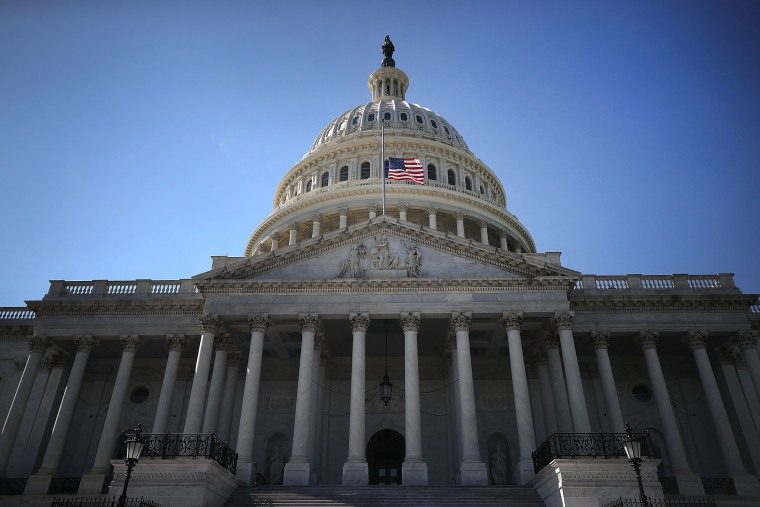One of the biggest storylines in the scandal related to Russia's interference in the U.S. election gets a congressional hearing triple feature this week. Here's what to expect as top lawyers for Facebook, Twitter and Google take their turns in the hot seat.
What's happening?
Testimony from the tech titans will be a chance to get the most complete picture of how Russian actors used sponsored posts, bots and fake accounts to boost fake news, stoke racial and political schisms, and even try to organize real-life rallies.
The hearings are part public investigation and part political performance art. On the one hand, they're a chance to get deeper answers on the record from the social media giants about the depth and scope of Russian meddling.
But they're also an opportunity for Silicon Valley to appear contrite and say they're "taking it seriously" by implementing proactive measures — thereby tempering any aggressive outside regulatory push.
Where can I watch?
You can watch live coverage of the hearings on MSNBC or check for livestreams of the hearings online on the individual committee pages:
Senate Judiciary Committee — Tuesday at 2:30 p.m.
Senate Select Committee on Intelligence — Wednesday at 9:30 a.m.
House Intelligence Committee — Wednesday at 2 p.m.
But you won't see Facebook or Twitter CEOs Mark Zuckerberg and Jack Dorsey putting their hand on the bible and sweating under the lights. Instead, the tech companies are mainly sending their general counsels: Facebook's Colin Stretch; Twitter's Sean Edgett (acting); Google's Kent Walker, also a senior vice president; and Richard Sanlango, Google's head of law enforcement and information security.
Each committee will have its questions, but the real fireworks are expected Wednesday during the House Intelligence Committee hearing.
What kind of questions will be asked?
The tech giants will be pressed for specifics on how the Russian-linked companies exploited these platforms, reported Quartz, citing conversations with congressional aides. They'll be grilled on who was targeted and what metrics there are to track ads in terms of cost and impact.
The platforms will also be asked to help paint a timeline for their own internal response and describe that process. And they'll be charged with answering how we secure the next election. Campaigns for 2018 congressional elections have already begun.
Facebook has already handed over to the committees 3,000 ads paid for in rubles it identified as linked to a Russian state-sponsored "troll farm" called the "Internet Research Agency." Twitter has also given data based on Twitter accounts linked to those revealed by Facebook.
But Facebook is expected to be even more forthcoming, including supplying examples of "organic posts" that weren't paid to be promoted but still came from the Russia-linked accounts.
In one of the Kremlin-tied Facebook pages, a post for the "SecuredBorders" group posted an image of a body exploding in a minefield. "Like if you agree," read the post's text. "Border wall is good, border minefield is even better."
On Twitter, Russia-linked accounts commanded armies of Twitter bots to boost bogus news hashtags, pumping out tweets to perpetuate the slanderous lie of a pedophile ring linked to Hillary Clinton that was based in a Washington pizza parlor. It got enough traction that one internet user felt compelled to travel to the pizza parlor to investigate with a gun and fire off a shot.
Google has managed to mostly stay out of the public ire but it has also uncovered Russia-backed ads that ran on its YouTube video service.
Some of the ads that appeared on Facebook were geographically targeted using Facebook's self-serve ad program, open to anyone. But The Washington Post reported that some of those ads were targeted using Facebook's custom audience tool, where an advertiser can upload its own set of email addresses and target accounts. The question is where the agitators would have gotten that list of accounts — and why.
Congressional sources have raised questions about Cambridge Analytica, a voter data targeting company run by Robert Mercer, a conservative hedge-fund tycoon who donated to President Donald Trump's campaign. Mercer also funded the hard-right news site Breitbart, run by former Trump adviser Steve Bannon — who formerly sat on the board of Cambridge Analytica.
In September 2016, the Trump campaign paid Cambridge Analyitca $5 million to help it target voters.
What about Trump?
The hearings come after the investigation led by special counsel Robert Mueller handed down indictments for former Trump campaign manager Paul Manafort and his associate Rick Gates, asking them to turn themselves in. It was also revealed Monday that ex-Trump adviser George Papadopoulos pleaded guilty three weeks ago to lying to federal agents about his contacts with Kremlin-connected Russians.
But if you're expecting a Trump election blockbuster revelation from the hearings, prepare to be disappointed. That sort of information, should it exist, would be held by the FBI and only disclosed after the Mueller-led investigation concludes.

